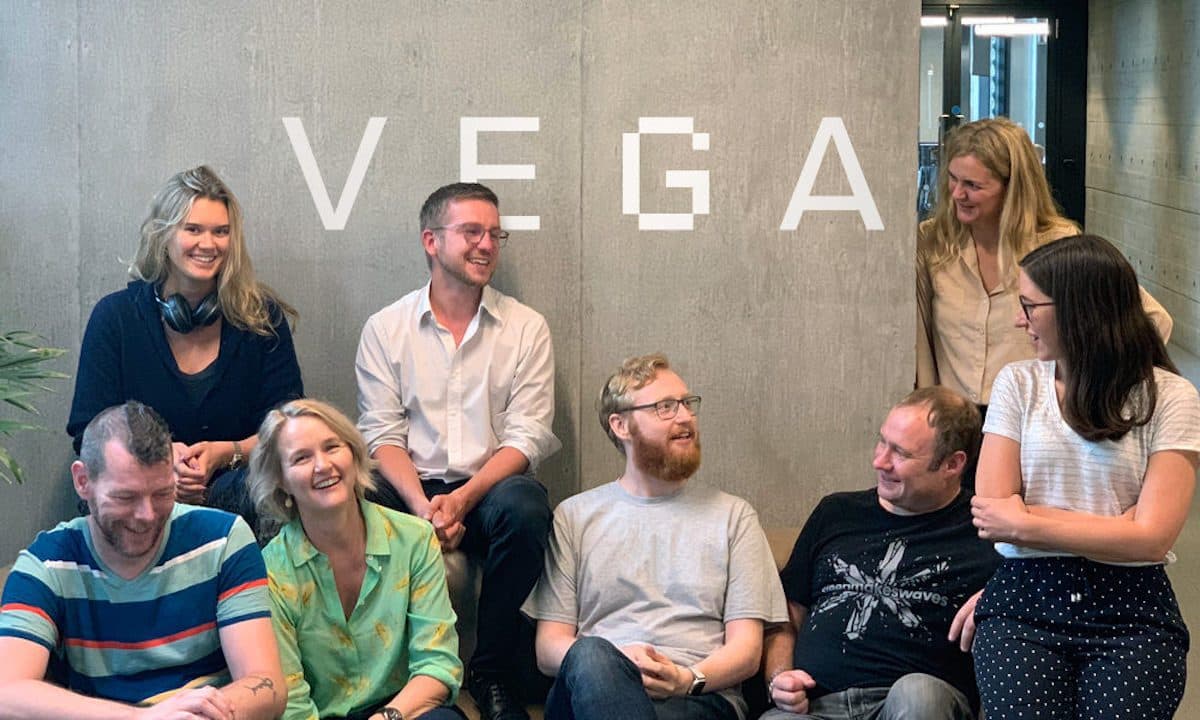Decentralized Exchange Vega Raises $5 Million
Decentralized exchanges, like Vega or Uniswap, are peer-to-peer exchanges for digital assets where users can transact without an intermediary.

BARNEY MANNERINGS, FOUNDER, Vega, third from right
- Vega’s decentralized protocol allows anyone to create and launch a decentralized derivatives market following the success of markets like Uniswap
- Coinbase Ventures involvement in the round is notable as it flagged DeFi as both a competitor and investment opportunity in its S-1
Vega has closed a $5 million round led by a number of well known VCs such as Arrington Capital and Cumberland DRW. Coinbase’s venture capital fund, among others, also contributed.
Vega aims to be the ‘Uniswap’ of digital assets derivatives trading, and is the product of two years of engineering efforts. Decentralized exchanges, like Vega or Uniswap, are peer-to-peer exchanges for digital assets where users can transact without an intermediary.
Exchange rules are governed by smart contracts, and the transactions occur automatically with parties agreeing to send a small percentage of the value of the exchange to a liquidity pool which facilitates the trade. There isn’t really an affiliated company behind the exchange as it exists as a series of smart contracts protocols on the blockchain.
Reimagining crypto
“Any derivative can be launched on-chain in a highly performant and capital-efficient environment,” Arrington Capital Partner Ninos Mansor said in a statement. “Just as the AMM primitive gave birth to an entirely new world of trading, we believe that Vega will unlock nascent collateral and reimagine crypto derivatives from the ground up.”
The protocol first launched a testnet in Q2 2020 and has drawn interest from institutional adopters. Vega’s team says that the protocol is ready for the high throughput required for high-volume derivatives trading.
“Derivatives trading has been a pillar of traditional finance for a long time, but DeFi has not been able to achieve the capital efficiency and throughput required to make decentralized derivatives trading viable, until now.” added Barney Mannerings, Vega’s Founder.
Speaking with Blockworks, Mannerings added that a big pain point they are seeing in centralized trading platforms is a belief from traders that they are being taken advantage of for their data by hedge funds. Traders on platforms like Robinhood, for example, aren’t getting a fair deal when their trading data is sold in exchange for free access to trades.
“The recent Gamestop fiasco illustrated how centralized trading platforms like Robinhood will take actions against the best interests of their traders to support their hedge fund relationships. High-frequency trading firms buy data from platforms like Robinhood on what traders are doing so they can profit from their trade flow,” Mannerings said to Blockworks.
“Trading with the Vega Protocol eliminates this conflict of interest by making all data public and transparently available on the blockchain. Vega also is the first capital-efficient decentralized trading protocol, made possible by the low margin and fee design. Given these advantages, we believe that Vega will be of interest to traders within crypto as well as professional traders coming from traditional finance,” he said.
Vega is currency advancing towards its Mainnet release, with plans to add self-custody options soon along with support for other digital assets like Bitcoin and Polkadot.
Buying into Vega
Many DeFi projects like Vega are decentralized, and don’t have a traditional corporate structure that allows for the purchase of shares like many other startups. Instead, investors purchase tokens.
Contributors to the round received tokens which will be used on the proof of stake Vega blockchain and for governance of the protocol when/if a network is launched that uses the protocol, a PR rep for the company confirmed.
Although the DeFi space is growing rapidly, VCs appetite for writing checks to projects in this area is limited. Not because VCs believe the potential for a return on investment is limited — but rather the way many VC funds capital allocators known as limited partners (LPs) are structured. Nonprofits such as endowments and pension funds will have difficulty booking returns from DeFi projects as the IRS categorizes this kind of income as a “trading activity” as opposed to a capital gain creating a nasty tax bill.
With that in mind, the investors that participated in this round all have prior experience in the digital assets, blockchain, and DeFi space — or like Coinbase are active market participants in the industry — and would likely be more willing to structure themselves accordingly to accommodate the deal.
Venturing into DEXs
In its S-1, Coinbase has flagged DEXs like Uniswap — unregulated platforms with low startup costs, it described them — as competitors even though that comparison might not be entirely accurate according to market analysts as Blockworks has previously reported.
Coinbase, with its 1,200 employees, generates less than $1 million in revenue per employee whereas Uniswap with its team of 14 generates more than $20 million. So while Coinbase says that on one hand it competes with decentralized protocols, its disclosure in its S-1 that it also invests in a number of them makes sense.
Especially investments in a decentralized derivatives exchange. Coinbase, as a soon-to-be publicly listed US-flagged enterprise, doesn’t want to go near derivatives trading as the US Commodity and Futures Trading Commission (CFTC) is actively probing one of its competitors, Binance, for allegedly allowing US residents to participate in it. This regulatory environment does put Coinbase at a significant disadvantage, according to one former CFTC enforcement attorney, but the market is placing a significant valuation on Coinbase’s compliance.
But Coinbase knows this market is only growing. Uniswap, after all, rose to be a “unicorn” with its billion dollars in volume in less than a year. The only question is, after Vega, what is Coinbase’s next decentralized investment?






